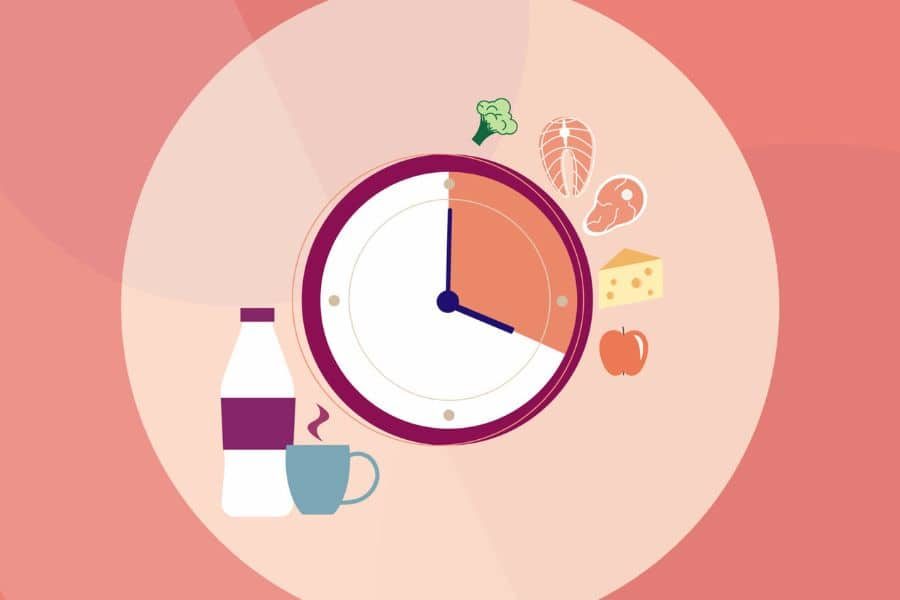Understanding Intermittent Fasting
Basics of Intermittent Fasting
So, you’ve decided to give intermittent fasting a whirl, huh? It’s not about what you eat, but more about when you chow down. By flipping the norm, this method helps in keeping those pesky pounds at bay and giving your health a boost.
There’re a few ways you can jump on the fasting bandwagon: the 16/8 twist, the 5:2 plan, or even just doing every other day. Each style has its own spin on fasting but the aim’s to find a groove that suits your life and health mojo.
How Intermittent Fasting Works
Here’s the deal: when you fast, your body starts burning fat after it runs out of sugar reserves. This shift, fancy called “metabolic switching,” means your system starts using fat instead of sugar—a win for weight loss.
Fasting drops your insulin like it’s hot, helping burn fat like crazy and making that stubborn stored fat easier to reach. Plus, fasting cranks up your norepinephrine—a sort of supercharger for metabolism.
If you’re just dipping your toes in, try a 12-hour fast to start. It’s the 12:12 method, and who doesn’t love a beginner that’s mostly asleep? (Medical News Today). As you get used to it, stretch that fasting time out. The 16/8 method is a popular choice, letting you nosh during an 8-hour stretch, which has a rep for managing weight and keeping blood sugar in check.
| Fasting Method | Fasting Period | Eating Period | Typical Schedule |
|---|---|---|---|
| 12:12 Method | 12 hours | 12 hours | 7 PM – 7 AM |
| 16/8 Method | 16 hours | 8 hours | 8 PM – 12 PM |
| 5:2 Diet | 2 non-consecutive days | 5 days of normal eating | N/A |
| Alternate Day Fasting | Alternate days | Alternate days | N/A |
To really make intermittent fasting work for you, keep sipping on that water and dig into nutrient-packed foods when it’s chow time. Want more tips to kick off your fasting adventure? Check out our no-fuss beginner’s guide to intermittent fasting.
But hey, it’s not just about the weight. Research shows fasting might also lend a hand in handling chronic stuff like diabetes and heart issues. Of course, before stepping into any fasting zone, a chat with your doctor is smart to make sure it’s A-OK for you (UC Davis Health).
Getting to know how fasting affects your body can help you pick the right pace for your goals, turning intermittent fasting into a solid ally for managing that waistline. Keen to know more about what fasting can do for you? Dive into our look at the benefits of intermittent fasting.
Benefits of Intermittent Fasting
Intermittent fasting does a lot more than helping you drop a few pounds. If you’re curious or already loving it, knowing the real advantages can help you stick with it.
Weight Loss Benefits
One biggie with intermittent fasting is its knack for weight loss. This way of eating might help you slim down by cutting calories naturally and keeping your hunger in check. Here’s the scoop:
- Cutting Calories: By shrinking that window when you eat, you automatically munch on fewer calories.
- Feeling Full: The fasting time can make you feel satisfied longer and keep hunger at bay.
A 2017 study showed both intermittent fasting and everyday calorie counting work equally well for shedding pounds over a year (Medical News Today).
| Method | Weight Loss Effectiveness |
|---|---|
| Intermittent Fasting | Just as good as Counting Calories |
| Calorie Counting Diet | Works like Intermittent Fasting |
For your own fasting schedule, pop over to our intermittent fasting schedule page.
Health Improvements
Intermittent fasting isn’t just about the numbers on the scale. It’s packed with health perks, too:
- Boosts Metabolism: Fasting is linked to better metabolic health, like lowering blood pressure, blood sugar, and fat in your blood.
- Fights Illness: Studies hint that fasting could help fight off obesity, diabetes, and heart problems (Johns Hopkins Medicine).
- Lowers Risks: It’s as useful as other diets for cutting down the risk of diseases tied to obesity like diabetes, snoring problems, and some cancers (Mayo Clinic).
| Health Aspect | Improvement | Source |
|---|---|---|
| Metabolic Health | 👍 | Healthline |
| Disease Prevention | 👍 | Johns Hopkins Medicine |
| Risk Reduction | 👍 | Mayo Clinic |
For more on what fasting can do, hop over to our intermittent fasting benefits section.
Jumping into intermittent fasting helps with weight, perks up your metabolism, and slices your risk of some serious health problems. Ladies thinking about this method can find extra tips on our intermittent fasting for women page.
Different Types of Intermittent Fasting
Hungry for a healthier you? There’s a bunch of ways you can play with fasting to drop those pounds and feel awesome. Let’s talk about three popular choices: the 16/8 method, the 5:2 diet, and alternate day fasting.
16/8 Method
Ever hear of not eating just for kicks? The 16/8 method, also known as the Leangains diet, is exactly that! You don’t eat for 16 hours, and then you go ham for 8 hours. Easier than pulling an all-nighter, right? Skipping breakfast is a cinch, so just chow down from noon to 8 PM and you’re golden (Healthline).
- Example Schedule:
- Eating Time: From 12 PM to 8 PM
- Fasting: From 8 PM to 12 PM
| Gender | Start Fasting Duration | Benefits |
|---|---|---|
| Males | 16 hours | Manage weight, better blood sugar |
| Females | 12-14 hours (gradual to 16) | Shed pounds, feel fuller longer |
Curious how to make it work for you? Peek at our intermittent fasting schedule for your perfect fit.
5:2 Diet
Okay, 5:2 diet time! Eat like usual for five days and barely eat for two. It’s math, but delicious! On those “barely” days, gals munch on 500 calories, guys get 600 (Medical News Today).
- Example Week Game Plan:
- Normal Days: Monday, Tuesday, Thursday, Saturday, Sunday
- Lean Days: Wednesday, Friday
- Calorie Count on Lean Days: Women: ~500, Men: ~600
Alternate Day Fasting
Got a rhythm for you! Alternate day fasting (ADF) is flip-flopping between normal feast days and mini-meal days. Some folk go all-out fast; others nibble on 500 calories. Studies say ADF is a worthy contender against your grandma’s low-calorie diet (Mayo Clinic).
- Example ADF Groove:
- First Day (Eat Up): Regular meals
- Second Day (Lean Back): Stick to about 500 calories
- Third Day (Eat Up Again): Regular meals
- Fourth Day (Lean Back): Stick to about 500 calories
Check out our take on making this diet part of your groove here.
These styles give you wiggle room—pick what jives with your routine and beats your weight goals! If you’re new to this scene, dive into our intermittent fasting for newbies guide to get rolling. Always tune into what your body’s telling you and tweak your plan as needed.
Implementing Intermittent Fasting
Starting Intermittent Fasting
Kicking off with intermittent fasting is pretty straightforward and can even be fun once you get the hang of it. First up, nail down which fasting style suits you best. Here’s the lowdown on the most popular approaches:
- 12-Hour Fasting: You fast for 12 hours, then chow down within the next 12. Perfect for newbies since you’re asleep for a good chunk of it, and it might just help you burn that stubborn fat and shed some pounds (Medical News Today).
- 16/8 Method: Fast for 16 hours and eat all your grub in an 8-hour window. Also known as the Leangains diet, this can help manage weight and keep your blood sugar in check. Guys generally start with 16 hours, while ladies might wanna ease into it (Medical News Today).
- 5:2 Diet: Eat as usual for five days, then for two days, stick to just 500-600 calories. It’s all about flexibility and works for keeping that weight in check.
- Alternate Day Fasting: Feast on one day, fast or eat light the next. Studies say it’s as good as calorie-slashing diets when it comes to weight loss.
Tips for Success
Wanna rock intermittent fasting? Here’s some handy advice:
-
Ease Into It: If you’re starting out, maybe try a 12-hour fast then stretch it longer over time as your body gets the memo.
-
Hydrate Like a Boss: Keep sipping water, herbal teas, or even clear broth during fasting to keep the thirsties at bay.
-
Choose Smart Foods: After fasting, pile on protein, healthy fats, fiber, and vitamins – they keep hunger at bay and give you tons of energy.
-
Don’t Hog Out: Go easy during meal times. Balanced meals help you drop pounds and keep you healthy overall.
-
Stick To a Schedule: Consistent fasting and feasting times help your system adapt, making fasting smoother and more effective.
-
Tune Into Your Body: If you feel like trash, tweak your fasting routine. Every body is different, so find your own groove.
-
Get Moving: Pair fasting with your fave workouts for the win. For more tips, hit our page on fasting and exercise.
| Fasting Style | Fast Duration | Eat Time | Good For |
|---|---|---|---|
| 12-Hour | 12 hrs | 12 hrs | Newbies |
| 16/8 | 16 hrs | 8 hrs | Seasoned Pros |
| 5:2 | 2 days (500-600 cal) | Eat normally on other 5 days | Flex Buffs |
| Alternate Day | Fast every other day | Eat normal in between | Weight Warriors |
Follow these tips and you’ll be smashing your weight loss goals while also snagging those extra health perks. For the full scoop on getting started, peep our beginner’s guide.
Considerations for Intermittent Fasting
Thinking about giving intermittent fasting a shot to drop some pounds and boost your health? Before you jump in, let’s chat about the stuff you might bump into and how to keep it safe and sound.
Potential Side Effects
Intermittent fasting has its perks, sure, but it might also throw a few gnarly punches your way. Here’s the lowdown:
| The Side Effects List | What’s Going On? |
|---|---|
| Hunger and Cravings | It’s not unusual to feel hungrier than a starving squirrel when you first start. |
| Feeling Tired | Missing your regular meal times might drain your energy quite a bit at first. |
| Aches in the Noggin | You might feel like you’re wearing a headache hat as your body gets used to fewer meals. |
| Stomach Grumbles | Things could get a bit rocky down there, with potential constipation or the runs. |
| Mood Swings | Watch out for that grumpy feeling known as “hanger” when the tummy rumbles hit hard. |
Certain folks need to tread carefully, especially if you’re on meds for stuff like diabetes or heart-related issues. Skipping some meals could mess with your meds, so a doctor’s advice is golden (Harvard Health Publishing).
Safety Guidelines
If you’re ready to dip your toes into intermittent fasting land, here are some pointers to keep things smooth:
-
Take It Easy: If you’re green to fasting, start simple. A 12-hour fast is beginner-friendly since you’re asleep half the time anyway. Let your body get the hang of it and stretch those hours gently.
-
Drink Up: Chugging water and non-sugary drinks keeps hunger at bay and prevents dehydration – no one needs a thirst trap.
-
Eat Smartly: When it’s grub time, go for the good stuff. Lean meats, healthy fats, and slow-release carbs are your buddies.
-
Be Your Body’s Friend: If your body’s sending out SOS signals like serious dizziness, or any funky feelings, change things up or call in the doc.
-
Check with the Pros: Health issues or meds? Give your doc a ring. Especially if blood sugars or heartbeats are in play.
Want more tailored tips? Swing by our intermittent fasting for beginners article. Stick to these friendly tips and keep an eye on what your body is saying, and you’ll be striding towards a healthier, happier you without breaking a sweat.
Intermittent Fasting Research
Studies and Findings
Intermittent fasting isn’t just another diet buzzword; it’s been making waves for some solid reasons. Let’s peek at what the research world has to say:
- Back in 2017, there was this neat trial that put intermittent fasting head-to-head with a regular calorie-slashing diet over the span of a year. Both approaches turned out to be equally good at helping folks shed those extra pounds. Check it out yourself over at Medical News Today.
- Some studies with our animal pals hinted that fasting might lower cancer risk. It seems that by shedding pounds, you might also be giving a thumbs-down to insulin and inflammation that hang out with cancer (source: Medical News Today).
- Fast forward to 2023, research turned the spotlight on intermittent fasting as a potential delay tactic for Alzheimer’s. The magic happening during fasting seems to do some good for the brain (Medical News Today).
- The folks at Johns Hopkins Medicine suggest fasting could be the comeback hero against obesity, type 2 diabetes, and heart disease — those usual suspects worsened by our modern munching ways.
| Study Type | Key Finding |
|---|---|
| Human Trial (2017) | Fasting and cutting calories lead to the same weight loss. |
| Animal Studies | Might drop cancer risk by taming insulin and inflammation. |
| Human Research (2023) | Could slow down Alzheimer’s arrival. |
| General Research (Johns Hopkins) | Fights off obesity, diabetes, and heart issues. |
For a closer look at intermittent fasting outcomes, swing by our page on intermittent fasting results.
Impact on Overall Health
Fasting isn’t just about seeing a smaller number on the scale; it’s got its hands in various health perks too. Here’s what else it does for you:
- Battling the Bulge and Metabolic Health: Fasting gives the body more time to burn fat once sugar stores are empty, known as “metabolic switching”. This can be your ticket to kicking obesity and getting a grip on metabolic hiccups.
- Cancer Deterrent: By slashing insulin and cooling down inflammation thanks to weight loss, you might keep certain cancers at bay (Medical News Today).
- Brain Boost: That 2023 review we mentioned? It shows fasting might help push back Alzheimer’s by working its physiological wonders (Medical News Today).
For the lowdown on starting out, take a gander at our guide on intermittent fasting for beginners and our handpicked intermittent fasting meal plan.
Jumping into intermittent fasting can tune up your health in impressive ways. As you begin your fasting adventure, these research nuggets will arm you to make the most of this eating style.










